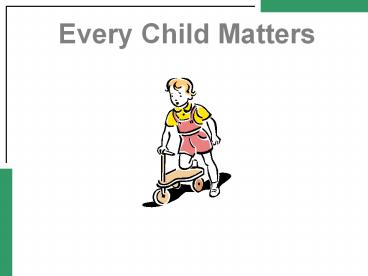Every Child Matters - PowerPoint PPT Presentation
1 / 11
Title:
Every Child Matters
Description:
Response to Lord Laming's enquiry into tragic death of Victoria Climbi ... In Gordon Brown's new government 2 departments replace the former DfES: ... – PowerPoint PPT presentation
Number of Views:49
Avg rating:3.0/5.0
Title: Every Child Matters
1
Every Child Matters
2
New context for ITE
- 2003 Govt published DFES green paper, ECM
- Response to Lord Lamings enquiry into tragic
death of Victoria Climbié - Paper aimed to tackle child safety key
underlying issues of poor integration of services
accountability - National framework of expectations
accountability publd in Dec 2004 - Every Child Matters Change for Children (Dfes,
2004)
3
ECM 5 aims central to all childrens lives
- Be healthy
- Stay safe
- Enjoy achieve
- Make a positive contribution
- Achieve economic well-being
4
Extended Schools Access to opportunities
services for all (Dfes, 2005)
- By 2010 all schools will offer core services
- Child care
- Health social care
- Study support
- Lifelong learning
- Sports Arts facilities
- Access to ICT
5
Common Core of Skills Knowledge for the
Childrens workforce (Dfes,2005)
- For all professionals working with children,
young people - Families
- Effective communication engagement
- Child young person development
- Safeguarding promoting the welfare of the child
- Supporting transitions
- Multi-agency working
- Sharing information
6
Teachers Role in these new contexts
- The teacher will work in collaboration with a
range of people - Including support staff, other professionals,
parents carers - The key to this collaborative working is
understanding the information flow - To whom
- From whom
- To what purpose
- They need to understand why how the context
within which they will be working is changing
the contribution they can make to that change
7
Background of Workforce Remodelling
- 2001 Price Waterhouse Cooper reported workload
was key reason for teachers leaving the
profession - 2003 National Agreement on Raising Standards
Tackling Workload - address work-life balance by reducing admin tasks
- Reduce time teachers spend covering for absent
colleagues - Introduce 10 planning, preparation assessment
time - May 2003 National Remodelling Team formed to help
schools remodel the workforce, implement the
National Agreement develop the capacity to
manage change
8
Standards linked to Workforce remodelling Q6,
Q20, Q32, Q33
- Q6 Have a commitment to collaboration and
co-operative working. - Q20 Know and understand the roles of colleagues
with specific responsibilities, including those
with responsibility for learners with special
educational needs and disabilities and other
individual learning needs. - Q32 Work as a team member and identify
opportunities for working with colleagues,
sharing the development of effective practice
with them. - Q33 Ensure that colleagues working with them are
appropriately involved in supporting learning and
understand the roles they are expected to fulfil.
9
Standards linked to ECMQ5, Q18, Q21
- Q5 Recognise and respect the contribution that
colleagues, parents and carers can make to the
development and well-being of children and young
people and to raising their levels of attainment. - Q18 Understand how children and young people
develop and that the progress and well-being of
learners are affected by a range of
developmental, social, religious, ethnic,
cultural and linguistic influences. - Q21 (a) Be aware of current legal requirements,
national policies and guidance on the
safeguarding and promotion of the well-being of
children and young people. - (b) Know how to identify and support
children and young people whose progress,
development or well-being is affected by changes
or difficulties in their personal circumstances,
and when to refer them to colleagues for
specialist support.
10
All change at the DfES on 28 June 2007
- In Gordon Browns new government 2 departments
replace the former DfES - i) Department for Children, Schools Families
(DCSF) - led by Ed Balls
- ii) Department for Innovation, Universities
- Skills led by John Denham
- The title and new focus in the DCFS clearly
reflects the - ECM agenda
11
Implications of ECM for ITE?
- How will the new childrens agenda impact on
- Course design?
- Course delivery?
- School-based learning?
- Assessment of trainee?
- Mentor training?
- Recruitment?































